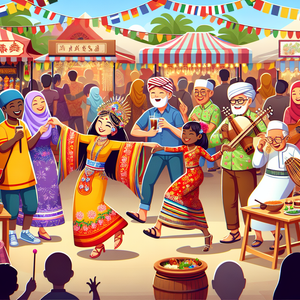The Evolution of Fanfiction: From Fandom to Published Works

Fanfiction, often defined as stories written by fans that expand upon existing characters and worlds, has roots that can be traced back to the early 20th century. The genre began gaining momentum in the 1960s with the rise of science fiction fandom. Early examples included zines—self-published magazines where writers could share their stories. Works inspired by "Star Trek," "Doctor Who," and other popular series allowed fans to express their creativity and engage with their beloved characters in ways that official media often did not. The internet revolution in the late 20th century marked a significant turning point for fanfiction. Online platforms emerged, providing fans with greater access to one another and the means to share their works with a global audience. Websites like FanFiction.net, which launched in 1998, and later Archive of Our Own (AO3), founded in 2008, became hubs for fan-created content. These platforms democratized storytelling, allowing writers to publish their stories, receive feedback, and connect with other fans. The ease of access provided by these sites enabled diverse perspectives and narratives that mainstream publishing often overlooked, empowering marginalized voices and expanding the boundaries of traditional storytelling.
Key Works and Their Impact
As fanfiction gained traction, some stories began to break through the confines of online platforms to achieve commercial success. One of the most notable examples is "Fifty Shades of Grey," originally written as a "Twilight" fanfiction titled "Master of the Universe." Its transformation into a best-selling trilogy not only demonstrated the potential for fanfiction to reach mainstream audiences but also sparked discussions about the legitimacy and artistry of the genre. Critics and fans alike debated the boundaries of creativity and originality, as "Fifty Shades" transitioned from a fan-created work to a cultural phenomenon. Similarly, "After," a story inspired by the boy band One Direction, rose to prominence, further validating fanfiction as a viable pathway to publication. Initially published as a serialized story on Wattpad, "After" became a bestseller, leading to a film adaptation. These transitions have had a profound impact on the literary landscape, challenging traditional publishing norms and forcing publishers to reconsider what constitutes a viable story and who qualifies as a legitimate author. The success of these works has opened the door for more authors to draw from their fandoms, resulting in a richer and more diverse array of narratives available to readers.
The Influence on Storytelling and Representation
The evolution of fanfiction has not only influenced the publishing industry but also the narratives themselves. Fanfiction often serves as a space for marginalized voices to tell stories that resonate with their experiences. Many fanfiction works address themes of representation, identity, and social justice, providing commentary on issues that are sometimes neglected in mainstream media. For instance, fanfiction has been instrumental in exploring LGBTQ+ relationships, allowing writers and readers to engage with narratives that reflect their identities. The popularity of "Destiel" (the romantic pairing of Dean Winchester and Castiel from "Supernatural") exemplifies how fanfiction has provided a platform for LGBTQ+ representation, fostering a community of acceptance and exploration. Moreover, the collaborative nature of fanfiction fosters a unique storytelling environment. Fans often build upon one another’s works, creating expansive universes where characters can evolve in myriad ways. This collaborative spirit encourages innovation and allows for the exploration of plotlines that may challenge traditional storytelling conventions. The practice of "remixing"—where writers take existing stories and alter them—has become a hallmark of the fanfiction community, showcasing the fluidity of narratives and the shared ownership of stories.
The journey of fanfiction from grassroots communities to mainstream publishing is a testament to the power of storytelling and the resilience of creative expression. As fanfiction continues to thrive, it reshapes the literary landscape by broadening the definitions of authorship and narrative. The genre not only provides a platform for diverse voices but also fosters a sense of community among fans, bridging gaps between generations and connecting individuals through shared passions. As we look to the future, it is clear that fanfiction will continue to play a pivotal role in the evolution of literature, paving the way for new and innovative storytelling that reflects the complexities of the human experience. The evolution of fanfiction is not just a trend; it is a revolution in the way we understand and engage with stories. The rise of platforms like AO3 emphasizes the importance of community, creativity, and inclusivity, marking a new chapter in the ongoing story of literature.
Content Strategist for Fanfiction Platforms
Archive of Our Own, FanFiction.net
Core Responsibilities
Develop and implement content strategies to enhance user engagement on fanfiction websites.
Analyze user data to identify trends and preferences, shaping content creation based on audience interests.
Collaborate with writers and community managers to curate and promote fan-generated content effectively.
Required Skills
Expertise in SEO and digital marketing strategies specific to the literary and fandom communities.
Strong analytical skills to interpret user data and feedback.
Excellent written and verbal communication skills tailored to a diverse audience.
Common Employers
Websites like Archive of Our Own, FanFiction.net, or publishing houses focusing on fan-inspired literature.
Community Manager for Literary Fandoms
Online fanfiction platforms, literary magazines
Core Responsibilities
Foster a vibrant online community by engaging with fans and encouraging participation in discussions about fanfiction and related topics.
Organize virtual events, such as writing challenges or fan debates, to maintain community interest and collaboration.
Monitor discussions to ensure a positive environment, addressing conflicts and providing support to community members.
Required Skills
Strong interpersonal skills with a passion for fan culture and storytelling.
Experience with social media management and community engagement strategies.
Understanding of the unique dynamics within fanfiction communities, including issues of representation and inclusivity.
Common Employers
Online fanfiction platforms, literary magazines, or publishers focusing on community engagement.
Editor for Fanfiction Publications
Independent publishing houses, literary journals
Core Responsibilities
Review and edit submitted fanfiction manuscripts for coherence, style, and adherence to publication standards.
Provide constructive feedback to authors, helping them refine their narratives and character development.
Collaborate with writers to ensure diversity and representation in published works.
Required Skills
Background in editing fiction, with familiarity in various genres, particularly those popular in fanfiction (e.g., romance, fantasy).
Strong knowledge of narrative structure, character arcs, and thematic development.
Ability to work sensitively with authors from diverse backgrounds.
Common Employers
Independent publishing houses that focus on fan-inspired works, literary journals, or online platforms looking to publish curated content.
Marketing Specialist for Fanfiction Adaptations
Publishing houses, film studios
Core Responsibilities
Create and execute marketing campaigns for books or films based on popular fanfiction, targeting both established fan communities and new audiences.
Collaborate with authors and publishers to develop promotional materials that resonate with fan cultures.
Analyze market trends and audience responses to refine marketing strategies for future adaptations.
Required Skills
Experience in marketing, particularly in the publishing or entertainment sectors.
Strong understanding of fanfiction and its cultural implications, alongside traditional marketing techniques.
Creativity in developing campaigns that engage both fans and the general public.
Common Employers
Publishing houses, film studios, or marketing agencies that specialize in media adaptations.
Research Analyst in Literary Trends
Literary organizations, academic institutions
Core Responsibilities
Conduct in-depth analysis of trends in fanfiction, including themes, genres, and demographic engagement.
Produce reports on the impact of fanfiction on traditional publishing and media, using data to inform industry stakeholders.
Collaborate with academic institutions or literary organizations to present findings at industry conferences.
Required Skills
Strong research and analytical skills, with a focus on literary studies or cultural analysis.
Ability to synthesize data into clear, accessible reports for various audiences.
Familiarity with qualitative and quantitative research methods, especially within digital communities.
Common Employers
Literary organizations, academic institutions, or market research firms focusing on cultural trends.


